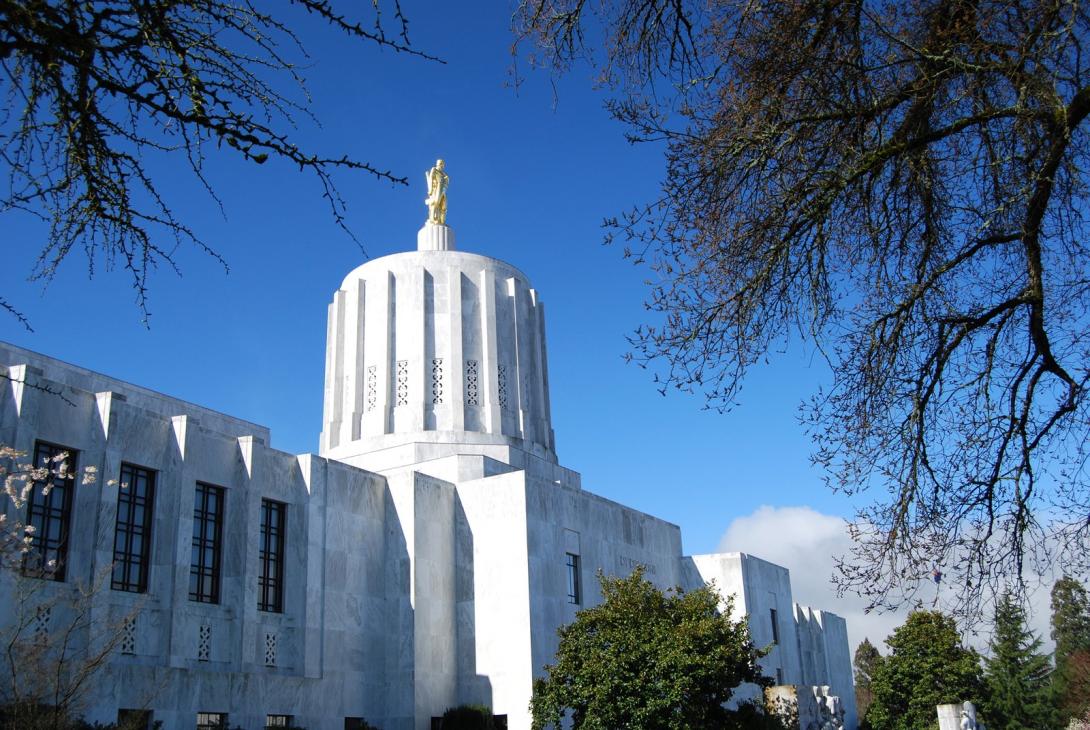
Gov. Kate Brown on Tuesday called for a special session of the Legislature next week to address the COVID-19 pandemic and police accountability reforms.
The special session will start on Wednesday June 24. Brown said she expects to call a second special session later this summer to deal with state budget cuts. The state has a projected revenue shortfall of $2.7 billion for the rest of the two-year budget cycle, which ends June 30, 2021.
The special session comes on the heels of a tumultuous three months in Oregon and the United States. The pandemic has strained the health care system and the economy, as businesses shut down or reduced services to slow the spread of the virus. State revenues have plummeted and forced state and local agencies to look for ways to patch budgets or make cuts. Meanwhile, the murder of George Floyd in Minneapolis has sparked protests across the U.S. and calls for systemic police reforms that stop racism and discrimination.
“We are at a unique moment in America,” Brown said in a statement. “I am calling a special session to take up two urgent issues facing our state: the COVID-19 pandemic and police accountability.”
Brown said the state needs to put several pandemic-related policies into law, including her temporary moratorium on evictions. Brown’s executive order forbids landlords from evicting tenants for failure to pay during the pandemic.
Brown said she also wants a policy that protects federal COVID-19 rebate payments from garnishment to become law. The federal Coronavirus Aid, Relief, & Economic Security Act gave each qualifying American up to $1,200 to soften the economic hardship during the pandemic.
Brown signed an executive order that prohibits the garnishment of the CARES stimulus payments, unless the garnishment order is tied to a criminal offense.
Potential legislative concepts for the special session also include foreclosure protections and broadband for virtual schools, according to a draft list circulating among lawmakers and obtained by The Lund Report. The list has a proposal that mirrors Brown’s executive order requiring state and local agencies to meet virtually when possible during the pandemic.
Charles Boyle, a spokesman for Brown, said the governor’s office developed the list based on conversations with legislative leadership and Brown’s priorities for the session. However, Boyle said it is “not a definitive list, and subject to change.”
The state budget crisis is looming. Brown has ordered state agencies to draw up plans for potential 17% budget cuts for the rest of the budget cycle. For the Oregon Health Authority, that translates into more than $370 million in cuts when factoring in lost federal matching Medicaid funds.
The authority’s proposal would remove 173 beds from Oregon State Hospital, which serves people with mental health needs. Medicaid, a $6 billion-a-year program, would lose $64 million, or $233 million when factoring in matching federal money.
The cuts are not set in stone, and it’s unclear how much Brown and lawmakers may tap reserves to avoid budget cuts.
Brown also hopes the federal government will help states avoid deep cuts.
“I expect to call a second special session later in the summer to rebalance our state’s budget,” Brown said. “In the meantime, I will continue pressing Congress to support the state and local governments that are reeling from the economic downturn. Unless the federal government takes action, states like Oregon could be forced to make significant cuts to schools, health care, and senior services.”
Brown said she is finalizing a list of $150 million in general fund savings for this biennium. The governor’s office will release the details at the end of this week, Brown said.
Democratic legislative leaders supported Brown’s move and continue to push for federal relief.
“These issues demand urgency,” House Speaker Tina Kotek, D-Portland, said. “The state’s budget shortfall must also be addressed soon, although my hope is the federal government will pass another coronavirus relief package to help state and local governments before the Legislature convenes to rebalance the budget.”
Senate Majority Leader Rob Wagner, D-Lake Oswego, said: “Oregon is also facing a significant budget shortfall as a result of our public health crisis, one which will take years to fully recover from.”
Wagner said Oregon needs the federal government to provide “swift action” so Oregon can preserve public services during the pandemic.
But Senate Republican Leader Fred Girod of Stayton questioned Brown’s move to call a special session that does not prioritize the budget deficit, calling it “disastrous for the state and Oregonians.”
“The intent of this special session should be to balance the state budget, which is the fundamental job of the Legislature, and provide relief to Oregonians suffering from the ongoing COVID-19 economic disaster,” Girod said in a statement. “Instead, the governor is prioritizing policy bills.”
Girod noted Marion County is still in Phase 1 and cannot have gatherings of more than 25 people and the Legislature, not counting support staff, has 90 people.
“Why not address the budget, the legislature’s first priority, instead of opening the door to costly follow-up sessions?” Girod said.
However, Senate President Peter Courtney, D-Salem, defended Brown’s decision.
“While I was preparing for a special session to address the budget, I understand why the governor is holding off,” Courtney said in a statement. “I hope Congress will act soon to get the states more resources. Without additional federal supports, we have some hard cuts ahead of us.”
You can reach Ben Botkin at [email protected] or via Twitter @BenBotkin1.
